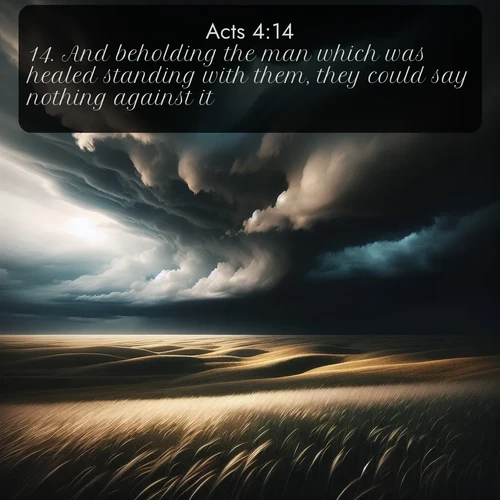Acts 4:14 plusieurs versions / traductions
English Bible Translations
14. And beholding the man which was healed standing with them, they could say nothing against it.
14. And seeing the man that was healed standing with them, they could say nothing against it.
14. And, seeing that the man who had been made well was there with them, they were not able to say anything against it.
14. And beholding the man who had been healed standing with them, they had nothing to reply;
14. And beholding the man who was healed standing with them, they could say nothing against it.
14. and seeing the man standing with them who hath been healed, they had nothing to say against [it],
German Bible Translations
14. Sie sahen aber den Menschen, der geheilt worden war, bei ihnen stehen und hatten nichts dawider zu reden.
14. Da sie aber den Menschen bei ihnen stehen sahen, der geheilt worden war, konnten sie nichts dagegen sagen.
French Bible Translations
14. Mais comme ils voyaient debout avec eux l'homme qui avait été guéri, ils n'avaient rien à répliquer.
14. Mais comme ils voyaient là près d’eux l’homme qui avait été guéri, ils n’avaient rien à répliquer.
14. Mais comme ils voyaient là près d'eux l'homme qui avait été guéri, ils n'avaient rien à répliquer.
14. Et, voyant là présent avec eux l'homme qui avait été guéri, ils n'avaient rien à opposer.
14. Et voyant que l'homme qui avait été guéri, était présent avec eux, ils ne pouvaient contredire en rien.
14. Et voyant que l'homme qui avait été guéri, était présent avec eux, ils n'avaient rien à opposer.
Versions with Strong Codes
Acts 4 / KJV_Strong14. And[G1161] beholding[G991] the[G3588] man[G444] which was healed[G2323] standing[G2476] with[G4862] them,[G846] they could[G2192] say nothing against[G471] [G3762] it.
Strong Code definitions
G1161 de/deh a primary particle (adversative or continuative); but, and, etc.:--also, and, but, moreover, now (often unexpressed in English).
G991 blepo/blep'-o a primary verb; to look at (literally or figuratively):--behold, beware, lie, look (on, to), perceive, regard, see, sight, take heed. Compare 3700. see G3700
G3588 ho/ho, including the feminine to to in all their inflections; the definite article; the (sometimes to be supplied, at others omitted, in English idiom):--the, this, that, one, he, she, it, etc.
G444 anthropos/anth'-ro-pos from G435 and ops (the countenance; from G3700); man-faced, i.e. a human being:--certain, man. see G435 see G3700
G2323 therapeuo/ther-ap-yoo'-o from the same as G2324; to wait upon menially, i.e. (figuratively) to adore (God), or (specially) to relieve (of disease):--cure, heal, worship. see G2324
G2476 histemi/his'-tay-mee a prolonged form of a primary stao stah'-o (of the same meaning, and used for it in certain tenses); to stand (transitively or intransitively), used in various applications (literally or figuratively):--abide, appoint, bring, continue, covenant, establish, hold up, lay, present, set (up), stanch, stand (by, forth, still, up). Compare 5087. see G5087
G4862 sun/soon a primary preposition denoting union; with or together (but much closer than 3326 or 3844), i.e. by association, companionship, process, resemblance, possession, instrumentality, addition, etc.:--beside, with. In composition it has similar applications, including completeness. see G3326 see G3844
G846 autos/ow-tos' from the particle au (perhaps akin to the base of G109 through the idea of a baffling wind) (backward); the reflexive pronoun self, used (alone or in the comparative 1438) of the third person , and (with the proper personal pronoun) of the other persons:--her, it(-self), one, the other, (mine) own, said, (self-), the) same, ((him-, my-, thy- )self, (your-)selves, she, that, their(-s), them(-selves), there(-at, - by, -in, -into, of, -on, -with), they, (these) things, this (man), those, together, very, which. Compare 848. see G109 see G1438 see G848
G2192 echo/ekh'o,/including/an/alternate/form a primary verb; to hold (used in very various applications, literally or figuratively, direct or remote; such as possession; ability, contiuity, relation, or condition):--be (able, X hold, possessed with), accompany, + begin to amend, can(+ -not), X conceive, count, diseased, do + eat, + enjoy, + fear, following, have, hold, keep, + lack, + go to law, lie, + must needs, + of necessity, + need, next, + recover, + reign, + rest, + return, X sick, take for, + tremble, + uncircumcised, use.
G471 antepo/an-tep'-o from G473 and 2036; to refute or deny:--gainsay, say against. see G473 see G2036
G3762 oudeis/oo-dice', including feminine ouden oo-den' from G3761 and 1520; not even one (man, woman or thing), i.e. none, nobody, nothing:-any (man), aught, man, neither any (thing), never (man), no (man), none (+ of these things), not (any, at all, -thing), nought. see G3761 see G1520
Prédications qui analysent les thèmes Actes 4
Thèmes : La guérison d'un paralytique; Pierre et Jean devant le Sanhédrin; Menaces et prière; La communauté des croyantsActes #6: Pas de duplicité dans l'Eglise
Actes #5: Personne d’autres que Jésus. Actes chapitre 4
Related Sermons discussing Acts 4
Themes : La guérison d'un paralytique; Pierre et Jean devant le Sanhédrin; Menaces et prière; La communauté des croyantsActs #6: No duplicity in the Church. Acts 4:32-5:11 (Acts 4); Patrice Berger
Acts #5: None other than Jesus. Acts chapter 4
see also: Bible Key Verses ; KJV Bible Images, BBE Bible images

